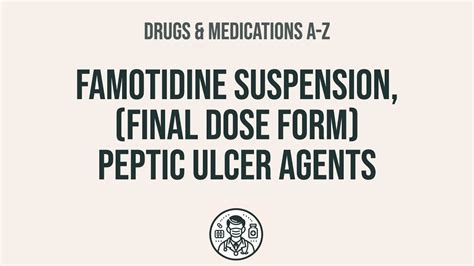Intro
Discover 5 famotidine side effects, including digestive issues, headaches, and dizziness, and learn how to manage them with proper medication and treatment, alleviating heartburn and acid reflux symptoms.
The importance of understanding the potential side effects of medications cannot be overstated, especially when it comes to commonly prescribed drugs like famotidine. Famotidine, known by its brand name Pepcid among others, is a histamine H2-receptor antagonist that inhibits stomach acid production. It is widely used for treating conditions such as gastroesophageal reflux disease (GERD), Zollinger-Ellison syndrome, and peptic ulcers. While famotidine is generally considered safe and effective, it can cause a range of side effects, some of which may be severe. Understanding these side effects is crucial for patients to make informed decisions about their health care.
Famotidine's mechanism of action involves reducing the amount of acid produced in the stomach, which can lead to relief from symptoms of acid reflux and ulcers. However, this alteration in stomach acid production can also lead to a variety of side effects, ranging from mild to severe. It's essential for patients to be aware of these potential side effects to monitor their health effectively while taking famotidine. Moreover, the prevalence of famotidine use, given its over-the-counter availability, underscores the need for comprehensive knowledge about its side effects to ensure safe and responsible use.
The side effects of famotidine can vary significantly among individuals, with some people experiencing no side effects at all, while others may encounter several. Factors such as dosage, duration of treatment, individual health conditions, and interactions with other medications can influence the likelihood and severity of side effects. As with any medication, it's crucial to weigh the benefits of famotidine against its potential risks and to closely follow the advice of healthcare professionals. By doing so, patients can maximize the therapeutic benefits of famotidine while minimizing its adverse effects.
Famotidine Common Side Effects

Less Common but Significant Side Effects
Less common side effects of famotidine can be more concerning and may require medical attention. These include but are not limited to: - Allergic reactions, which can manifest as hives, itching, swelling, or difficulty breathing. - Liver enzyme abnormalities, indicating potential liver damage. - Interstitial nephritis, a condition that involves inflammation of the kidney tubules. - Blood disorders, such as anemia or thrombocytopenia, which can affect the blood's ability to carry oxygen or clot properly. It's crucial for patients to be vigilant about monitoring their health and to seek immediate medical help if they experience any symptoms of these less common side effects.Famotidine Rare but Serious Side Effects

Special Considerations and Precautions
Certain individuals may need to exercise caution when taking famotidine, including the elderly, pregnant women, and those with pre-existing medical conditions such as kidney or liver disease. The dosage of famotidine may need to be adjusted in these cases to minimize the risk of side effects. Additionally, patients should be aware of potential drug interactions, as famotidine can affect the absorption or action of other medications. A comprehensive review of all medications, including over-the-counter drugs and supplements, with a healthcare provider is essential before starting famotidine.Minimizing Famotidine Side Effects

Importance of Patient Education
Patient education plays a critical role in the safe and effective use of famotidine. By understanding the potential side effects, patients can better manage their treatment and make informed decisions about their health. Healthcare providers should ensure that patients have access to clear, concise information about famotidine, including its benefits, risks, and proper use. This not only enhances patient safety but also promotes adherence to treatment regimens, leading to better health outcomes.Famotidine and Drug Interactions

Conclusion and Future Directions
In conclusion, while famotidine is a valuable medication for managing acid-related gastrointestinal conditions, its potential side effects must be carefully considered. By being informed about the common, less common, and rare side effects, as well as taking steps to minimize risks, patients can use famotidine safely and effectively. Ongoing research and patient education will continue to play crucial roles in optimizing the use of famotidine and other medications, ultimately leading to improved patient outcomes.Final Thoughts on Famotidine Use

A Call to Action
We invite readers to share their experiences or questions regarding famotidine and its side effects in the comments section below. Your insights can help others and contribute to a broader understanding of this medication. If you found this article informative, please consider sharing it with others who might benefit from this knowledge. Together, we can promote safe and effective medication use, improving health outcomes for everyone.What are the most common side effects of famotidine?
+The most common side effects of famotidine include headaches, dizziness, constipation, and diarrhea. These side effects are typically mild and transient.
Can famotidine cause serious side effects?
+Yes, while rare, famotidine can cause serious side effects such as severe allergic reactions, liver enzyme abnormalities, and interstitial nephritis. It's essential to seek medical help immediately if any severe symptoms occur.
How can I minimize the risk of side effects when taking famotidine?
+To minimize the risk of side effects, take famotidine as directed, with food if possible, and stay hydrated. Regular follow-up with your healthcare provider can also help in monitoring for any adverse effects and adjusting your treatment plan as necessary.
